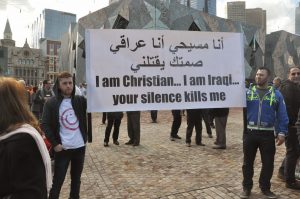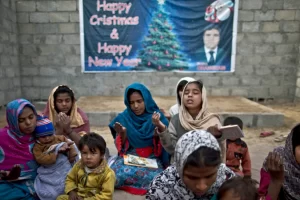While there is nothing unprecedented about religious persecution or even the genocide taking place in the world today, what is unprecedented is our ability to respond. For with today’s information and communication technologies, individuals, churches and any humanitarian organisations can be aware of a crisis taking place on the other side of the world, often as it unfolds, and respond immediately — for the saving of many lives. WE can make a difference.
“Silence in the face of evil is itself evil:
God will not hold us guiltless.
Not to speak is to speak. Not to act is to act.”
Quote attributed to German Lutheran pastor, theologian and martyr,
Dietrich Bonhoeffer
ACTION: SPEAK “Speak up for those who cannot speak for themselves . . . Those who due to displacement or systematic discrimination are impoverished and without means; those who have been silenced through imprisonment, intimidation, and threat; those who have been buried under a pile of propaganda, or pushed deep into the fog of war out of sight and out of mind, rely on our voice to make their plight known. So speak up and shatter the silence! Writing Letters to the editor—that is, emails written for publication—should be short (less than 250 words) and to the point. Do not include attachments or hyperlinks as these will usually result in your email being automatically rejected. The contact details of MPs are published on government websites. Although contacting them by email is acceptable, emails (which flood in daily) are easily deleted and risk being diverted to junk mail folders. For a whole lot of reasons, hard copy—good old ink on paper, bearing your signature, and travelling by “snail mail” to be received by hand—is better. When writing to an MP or diplomat, your letter must be polite but never patronizing or ingratiating. Hostile, demanding, lecturing letters are not well received and will likely be filtered out at the secretary’s desk. Letters need to be concise and to the point: one or two pages, with a decent font, decent spacing, and plenty of white space so it is easy on the eye. Use dot points, stay on track, keep focused. A letter that is long, complex, or verbose will probably not be read at all, and will also likely be filtered out at the secretary’s desk. Busy MPs and diplomats do not have time for rambling philosophical arguments, they simply what to know what concerns you and what you would like to see done. Include your contact details and keep any replies. If Christians and other concerned persons were to write routinely to their local MP, I imagine it would greatly improve the quality of partyroom and parliamentary debate—and the outcome. Swamping the foreign minister is but one form of advocacy; flooding the party room is another—one I suspect might be more effective. Finally and most critically, all speaking and writing must be reasoned, disciplined and gracious. If you are a Christian, your advocacy should undergirded, driven and sustained by prayer. Pray that God will direct your paths, give you the words, open the doors, and bless your efforts. For: “Unless the Lord builds the house, those who build it labor in vain” (Psalm 127:1 ESV). Click here to download “ACTION: Speak Up” as a pdf. A Word to Church Leaders and those who listen to them “A time comes when silence is betrayal.” Martin Luther King Jr. There are many reasons why Christian leaders are silent (or worse) on the matter of the horrendous, escalating persecution being suffered by their fellow believers. Not the least of which is the difficulty this subject poses for the peddlers of prosperity and those who like their Christianity “lite” with perpetual celebration and no strings attached. However, the most problematic reason—and I say “problematic” as it has such serious political consequences—is the faith many Christian leaders put in the failed strategy of “Quiet Diplomacy.” In their rush to jump on the political bandwagon, or make a name for themselves as political players, many influential Christian leaders and denominational heads have found themselves on a particular political path, the cost of which is a vow of silence. Though the signpost says “to dialogue”, the route goes by way of a covenantal agreement in which the Christians must promise not to criticize the persecutors. Only those with great faith in politics can agree to such a demand. Instead of speaking truth into power while trusting in the Lord (as did the prophets of old), Christian leaders who opt for Quiet Diplomacy will appease hostile powers at the expense of the persecuted trusting (or hoping) that their diplomacy and the political process will combine to deliver the desired end. What these Christian leaders fail to see is that while they are busy congratulating themselves for the coup of scoring dialogue with corrupt, lying dictators, religious “royalty”, proscribed terrorists and other persecutors, those persecutors are also busy congratulating themselves for the coup of scoring a vow of silence from influential Christian leaders. What these Christian leaders fail to understand is that silence is merely the entry fee, the cost of a seat at the table. The price for continuing dialogue goes up over time: Notwithstanding the fine intentions and noble goals of its Christian protagonists, Quiet Diplomacy simply does not work and invariably makes difficult situations worse. I believe it is a non-solution and an inappropriate response built on misplaced faith and flawed theology. Though we are called to be “as wise as serpents and as innocent as doves”, recognizing that we are “as sheep in the midst of wolves” (Matthew 10:16), nothing justifies an abandonment of truth or a betrayal of the persecuted. Christian leaders who engage in Quite Diplomacy (often through “Interfaith” initiatives) do so at virtually no cost to themselves. To the contrary, many reap great gains from their expeditions into the halls of power and photo opportunities with world leaders, religious “royalty” and recognized terrorists. When it comes to Quiet Diplomacy, the price is paid by others: the cost to the persecuted is enormous. NOTE: My first book, Turn Back the Battle: Isaiah Speaks to Christians Today (Deror Books, Dec 2012), provides a Biblical response to persecution and existential threat and was written specifically to counter the trend of Christians putting all their faith in political and military means. From Genesis through Revelation, God saves his people, by grace through faith. My second book, After Saturday Comes Sunday: Understanding the Christian Crisis in the Middle East (Wipf and Stock, Eugene, OR, USA, 2016) includes an appendix entitled, “Christian Solidarity: The Sound of Silence”, which examines the subject of Quiet Diplomacy in more detail, and includes a case study from the Cold War era. ACTION: PRAY Intercessory Prayer is Advocacy to the Highest Authority “For we do not wrestle against flesh and blood, but against the rulers, against the authorities, Pakistani Christians pray in a makeshift church in a slum on the outskirts of Islamabad, Pakistan [Muhammed Muheisen/AP] December 2015 Far from being a benign religious duty, a traditional formality, or an inappropriate interruption, true intercessory prayer is: We must have a higher view of the serious business of intercessory prayer! We Are Called to Pray for the Persecuted “Let brotherly love continue . . . Remember those who are in prison, as though in prison with them, and those who are mistreated, since you also are in the body” (Hebrews 13:1, 3 ESV). Suffering, anxious, persecuted believers are exceedingly vulnerable to spiritual attack. “Your adversary the devil prowls around like a roaring lion, seeking someone to devour” (1 Peter 5:8). And who better to stalk than a grief-stricken, confused, utterly exhausted, wounded believer? When we intercede, we interpose ourselves between the devil and his prey. Forget the glorified images of great heroes of the faith; persecuted believers need all the prayer support they can get. We are Called to Pray for the Persecutors “You have heard that it was said, ‘You shall love your neighbor and hate your enemy.’ But I [Jesus] say to you, Love your enemies and pray for those who persecute you, so that you may be sons of your Father who is in heaven. For he makes his sun rise on the evil and on the good, and sends rain on the just and on the unjust.’” (Matt 5:43–45a. See also, Luke 6:27–28, Romans 12:14). We need to pray that persecutors will be restrained, that they will come under conviction of sin, and that the God of all grace will open their hearts to receive the gospel. We also need to pray that the Holy Spirit will enable the persecuted to love, forgive and pray for those who persecute them. This is really important, for grace is not only a powerful witness, it is a powerful healer. We are Called to Pray for World Leaders “First of all, then, I urge that supplications, prayers, intercessions, and thanksgivings be made for all people, for kings and all who are in high positions, that we may lead a peaceful and quiet life, godly and dignified in every way. This is good, and it is pleasing in the sight of God our Savior, who desires all people to be saved and to come to the knowledge of the truth” (1 Timothy 2:1–4 ESV). --------------------------- Virtually all Christian aid and advocacy groups that serve the persecuted church also provide resources for prayer. Some send printed newsletters and prayer calendars, and virtually all send news and prayer requests via email. Further to this, Christian media organizations now exist for the purpose of reporting the religious (Christian) news the secular media ignores; some even specialize in reporting persecution. The information is out there; in fact these days, it is actually quite easy to be very well informed for the purpose of intercessory prayer. ACTION: GIVE “If a brother or sister is poorly clothed and lacking in daily food, Having fled Islamic jihad, military campaigns, ethnic cleanings, sectarian pogroms, violent persecution and systematic discrimination, hundreds of thousands of religious- and often ethnic-minority Christians are this day displaced, traumatized, and destitute. They have lost their homes, their savings, and their livelihoods. Many have lost everything but the clothes on their backs. To avoid further discrimination and persecution, displaced persecuted Christians tend not to seek sanctuary in UN camps; rather they prefer to find refuge amongst fellow Christians with whom they know they will be safe. Consequently, the burden of care falls not to the UN but to monasteries and local churches. From Syria and Iraq to Sudan and Burma, local Christians backed by local churches are providing displaced and persecuted Christians with warm clothes, shelter, food, infant milk formula, clean water, sanitation, pharmaceuticals, medical care, and education. Though willing to be God’s hands, they depend on funds coming in from God’s givers. Numerous Christian aid and advocacy groups, Christian charities of every denomination, and even former and currently serving missionaries, are delivering aid to persecuted and existentially imperiled Christians through secure, trusted, and well-established channels. Of course it is wise to only give or send money to well-established, recognized agencies or people whom you know and trust to avoid falling prey to scammers. I have no intention of providing a list of agencies that deliver aid directly to the persecuted, for to list is to limit. Rather, I advise individuals and churches to seek the Lord in this: pray. Ask the Lord to direct you—to open the door and lead you in the way he wants you to go. And while Christians will do this knowing that God hears and answers prayers because he is alive and engaged in the affairs of this world, concerned non-Christians (unbelievers) should give it a try too. God will honor this prayer, I guarantee it. For it is promised: “If any of you lacks wisdom, let him ask God, who gives generously to all without reproach, and it will be given him” (James 1:5). As for me, I totally trust the Lord in this. Putting this in God’s hands ensures that all needs will be covered. “For I was hungry and you gave me food, Speak
defend the rights of the poor and needy.”
(Proverbs 31:8–9 NIV) Silence renders sufferers invisible (which is exactly what their persecutors want). Speaking up, however, gives them form and presence.
Silence renders sufferers invisible (which is exactly what their persecutors want). Speaking up, however, gives them form and presence.
(including journalists and politicians)

Pray
against the cosmic powers over this present darkness,against the spiritual forces of evil in the heavenly places.
Therefore take up the whole armor of God... praying at all times in the Spirit, with all prayer and supplication.
To that end keep alert with all perseverance,making supplication for all the saints”
(from Ephesians 6:12–18 ESV).
Give
and one of you says to them, ‘Go in peace, be warmed and filled,’
without giving them the things needed for the body, what good is that?”
(James 2:15–16 ESV)
I was thirsty and you gave me drink,
I was a stranger and you welcomed me,
I was naked and you clothed me . . .
Truly, I say to you, as you did it to one of the least
of these my brothers and sisters,you did it to me [Jesus].”
(from Matthew 25:31–46 ESV)